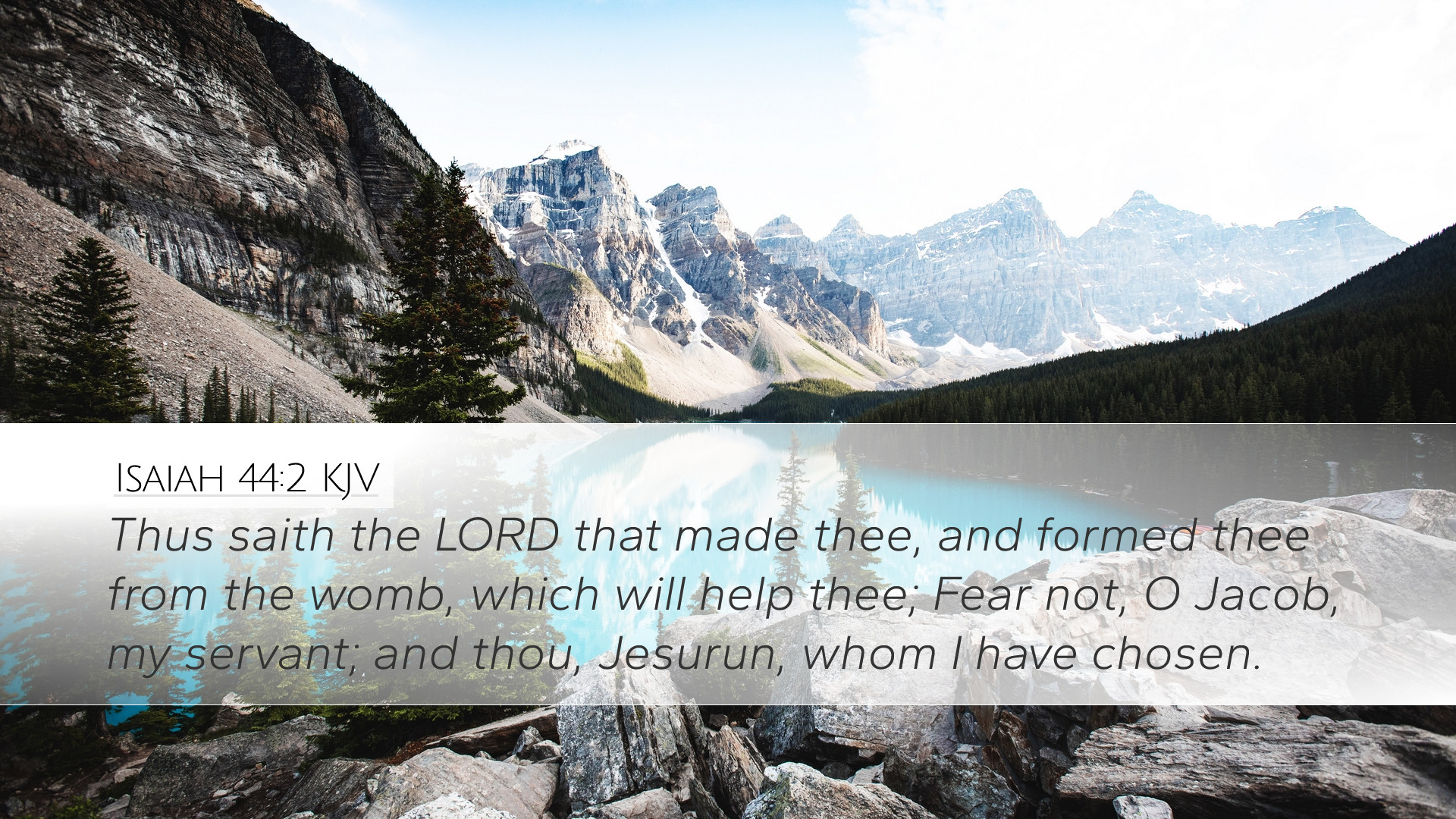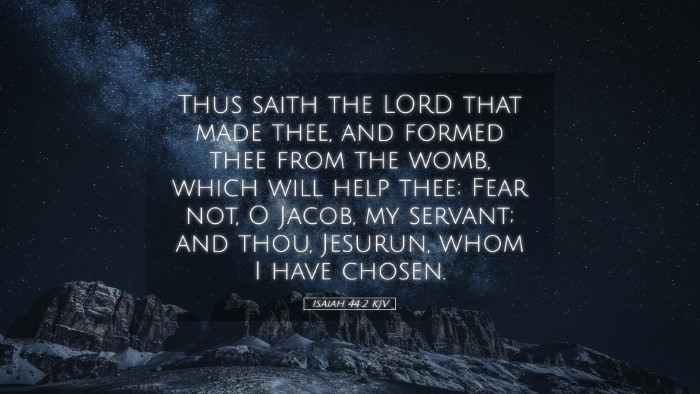Commentary on Isaiah 44:2
"Thus saith the Lord that made thee, and formed thee from the womb, which will help thee; Fear not, O Jacob, my servant; and thou, Jesurun, whom I have chosen."
General Overview
Isaiah 44:2 serves as a profound reminder of God's personal involvement with His creation and His enduring covenant with His chosen people, Israel. This verse is deeply pastoral, offering comfort amidst distress and uncertainty.
Insights from Public Domain Commentaries
Matthew Henry
Matthew Henry emphasizes the sovereign power of God in His creative act—He is the one who made and formed humanity. This ownership implies a commitment and care that God has toward His people. Henry outlines that God's intention is not merely to form, but to help, guiding His people through life's challenges. The names “Jacob” and “Jesurun” represent both the historical and spiritual aspects of Israel, indicating both their struggles and their ideal state of peace under God’s providence.
- Divine Creation: God's involvement in creation signifies His continuous relationship with His people.
- Assurance of Help: The assurance that God will help is a central theme—His guidance and support are always there for His faithful.
- Fear Not: The call to "Fear not" is a recurring biblical theme, emphasizing trust in God's promises despite external circumstances.
Albert Barnes
Albert Barnes focuses on the reassurance given to Jacob (Israel). He interprets "Jacob" as representing the entire nation and relates it to the themes of divine protection and redemptive purpose. Barnes notes that God’s choice of Israel is not predicated on merit but purely on His grace, highlighting God's active role in preserving His chosen people. He elaborates that "Jesurun" means "upright one," which signifies the potentiality within Israel to become a people aligned with God’s will.
- Covenant Relationship: God’s choice of Israel as His people illustrates His commitment to a covenant relationship.
- Grace Over Merit: The grace bestowed upon Israel illustrates that God's favor is not based on their righteousness but God's love.
- Hope for the Upright: The name “Jesurun” serves as a hopeful reminder of what Israel is meant to embody under God’s guidance.
Adam Clarke
Adam Clarke provides a detailed exploration of the spiritual implications of this verse, emphasizing the intimate knowledge God has of His people since their inception. Clarke argues that the phrase "formed thee from the womb" reflects God’s omniscience and omnipresence, indicating that God has an unwavering purpose for each individual and collectively for Israel. He expounds on the significance of being called God’s servant and the implications of that status in terms of identity and mission.
- Intimate Knowledge: God's formation of individuals showcases His intimate knowledge and investment in them.
- Identity as Servants: The identity as God's servants emphasizes a relationship rooted in obedience and submission to God's will.
- Divine Purpose: Each facet of creation is purposed by God, and believers are called to fulfill that divine intention.
Theological Implications
Isaiah 44:2 carries significant theological weight, particularly regarding the doctrines of creation, election, and providential care. It speaks to God’s sovereignty over His people in a tangible way, reminding pastors and theologians that understanding these attributes is essential for effective ministry and teaching.
Pastoral Application
For pastors, this verse serves as a source of encouragement. The assurance of God's help can inspire boldness in leadership and a deepened reliance on divine support in challenging circumstances. It also presents a reminder to instill confidence in congregational members about their worthiness in God's eyes.
Academic Reflection
For students and scholars, the exploration of this verse opens discussions on themes of identity, purpose, and the nature of God. It invites examinations of the historical context of Israel and encourages deeper study into the implications of God’s promises.
Conclusion
Isaiah 44:2 is a rich verse full of hope and affirmation. It serves as both a reminder of God’s powerful creative work and as an assurance of His steadfast help. The combined insights of Henry, Barnes, and Clarke provide a multi-faceted understanding that is meaningful for theological reflection, pastoral care, and personal faith.


